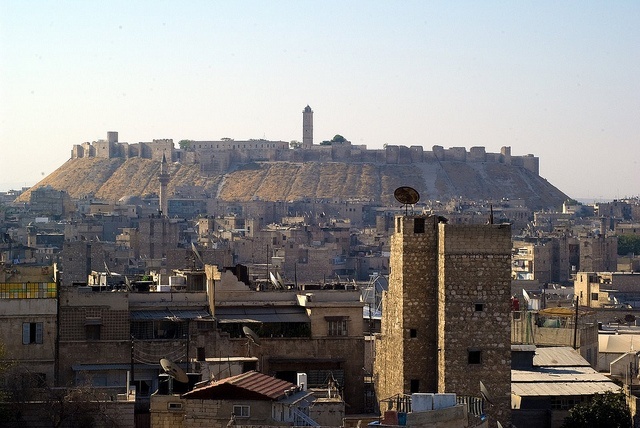
By Shaj Mathew
Chemical weapons have been deployed in Syria. After over two years of fighting, the conflict between rebel forces and the government of Bashar al-Assad shows no signs of abatement. Foreign powers may intervene. And yet, the sonorous voice of Adunis, the Syrian-born writer widely considered the world’s foremost Arab poet, has largely been silent. He did write an open letter to Bashar al-Assad in June 2011, but he was roundly criticized by fellow Arab intellectuals as being too soft on the dictator. Perhaps stung by this criticism, he has offered little comment since then.
His absence hasn’t prevented a new vein of Syrian poetry from emerging out of this uprising; a poem by Najat Abdul Samad, translated by Ghada al-Atrash for al Jazeera, epitomizes this movement’s jarring, visceral realism: “I bandage my heart with the determination of that boy/ they hit with an electric stick on his only kidney until he urinated blood./ Yet he returned and walked in the next demonstration…/ I bandage it with the outcry: ‘Death and not humiliation.’”
That said, according to fellow Syrian poet Maram al-Masri, “people are waiting for opposition poems from Adunis. He does a little, but for me and for a lot of people, we feel disappointed. It’s not enough. We need the fathers of modern Syrian poetry to speak out.” More damningly, the Iraqi littérateur Sinan Antoon told the Guardian that the Arab Spring has “consigned Adunis, the self-proclaimed revolutionary, to irrelevance.”
Although Adunis, who has lived in exile in Paris since the 1980s, may not be inclined to opine further on this conflict, his oeuvre contains a rich array of political poetry for those dissatisfied with his current silence. In particular, his 1963 poem “The Homeland,” translated into English by M.M. Badawi in the 1971 Journal of Arabic Literature, seems particularly apposite today. Throughout the poem, Adunis variously describes his homeland as a father, a stone, a house, a child, faces, and the streets: “all of these are my homeland, not Damascus,” Adunis writes.
At its core, “The Homeland” is a lament for Syrians and an acknowledgement of their sufferings, one that sadly still rings true some fifty years after its initial publication.
At its core, “The Homeland” is a lament for Syrians and an acknowledgement of their sufferings, one that sadly still rings true some fifty years after its initial publication. “To the father who died, green as a cloud/ With a sail on his face, I bow,” Adunis writes. These lines, with their wonderful simile, “green as a cloud,” capture the wartime fates of so many who died too young, with so much potential lost, the direction of their lives halted. An acidly sarcastic parenthetical aside—“(in our land we all pray and clean shoes)”—briefly interrupts the poem’s elegiac tone and warns against orientalist stereotypes. But Adunis waxes melancholic again in the poem’s final lines as he attempts to preserve the “dust” of a former home, his memories of hardship.
Read today, in light of the current revolutions, we can find a note of hope in Adunis’s poems, the promise of a better future after the necessary struggle.
Much of Adunis’ early poetry also seems relevant today, given its use of the phoenix as a symbol of resurrection, rejuvenation, renewal—ideas that are sorely needed in a time of near-constant violence and despair in Syria. His poem “Resurrection and Ashes,” for example, radically evokes both the predicament of the nation and the poet in describing “a bird in love with its death/ Who, for the sake of a new beginning/ Will burn itself alive.” This is a provocative call for rebirth, to say the least, albeit one that promises a better future. In their original context, these poems represented an attempt to save Arab society from sclerosis and corruption; when read today, in light of the current revolutions, we can also find a note of hope in them, the promise of a better future after the necessary struggle.
Adunis is a perennial contender for the Nobel Prize in Literature, though his lack of political or literary commentary on the ongoing Syrian conflict may diminish his candidacy in the eyes of the Swedish Academy, who, some have argued, tend to reward political writers. (His odds to win the prize this year are 14/1.) To focus on his current silence, however, would be to ignore his decades of remarkable political and literary activity in the Arab world, during which time he has by turns championed the causes of Syrian individualism and, later in his life, pan-Arabism. For those unhappy with Adunis’ lack of response to the war in Syria, look to the poet’s past, look to the people, places, and things that, as his poetry reminds us, make up a life worth remembering. Look to “The Homeland.”
The Homeland
By Adunis
To the faces that harden behind a mask of gloom
I bow, and to streets where I left behind my tears;
To a father who died, green as a cloud
With a sail on his face, I bow,
And to a child that is sold
In order to pray and clean shoes
(In our land we all pray and clean shoes);
To a stone I inscribed with my hunger,
Saying it was lightning and rain, drops rolling under my eyelids,
And to a house whose dust I carried with me in my loss
I bow—all these are my homeland, not Damascus.
Translated by M.M. Badawi
Shaj Mathew has contributed to the New York Times, The New Inquiry, Sports Illustrated, Lapham’s Quarterly, The Millions, The Philadelphia Inquirer, and McSweeney’s. He attends the University of Pennsylvania, where he is an Andrew W. Mellon Fellow of the Penn Humanities Forum.

